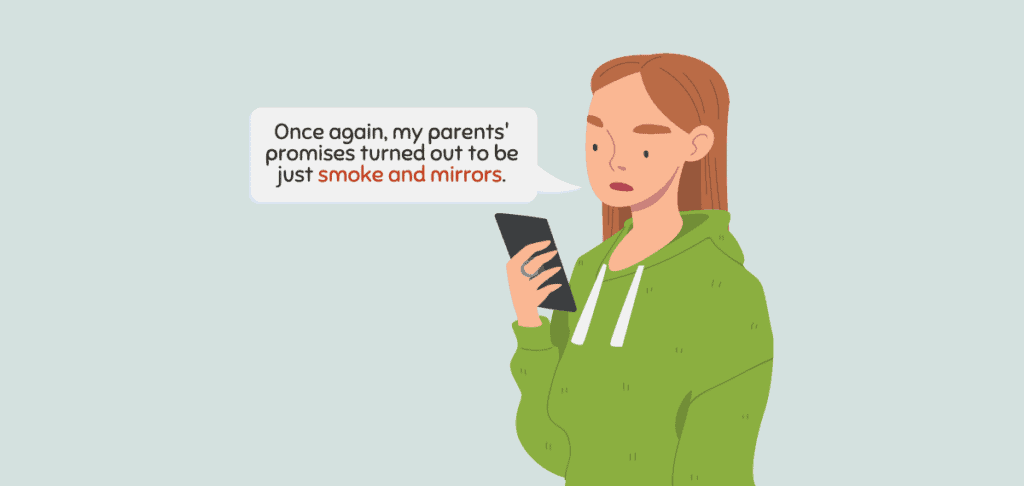Smoke and mirrors mean deception, trickery, or an illusion created to distract or mislead others. Just think of a magic show where the magician uses many showy gimmicks to distract you while performing the trick. That’s the essence of smoke and mirrors!
Idioms are words and phrases, often like proverbs, that don’t have a literal meaning. They are important to English because they help us communicate in more visual ways with our words, turning basic facts into colorful expressions.
But they only work if they fit the context and are used correctly. So, I’ll explain the meaning and origin of smoke and mirrors and add a few sentence examples at the end for you to check out.
Smoke and Mirrors Meaning Explained

The idiom smoke and mirrors describe situations where the truth is obscured, intentionally or inadvertently. Instead of a clear view, you encounter mystification. Imagine a funhouse of mirrors or a showy magic trick with a smoke machine hiding all the flaws of the performer.
In everyday life, smoke and mirrors could describe anything from the lure of influencer social media to a lying, cheating boyfriend who fills your ear with sweet promises. Steer clear of both of those.
Even though the saying usually has a negative connotation, you can put a positive spin on it, like when describing the way your friends hid a surprise from you for weeks. “They used smoke and mirrors to make me think they forgot about my birthday, so I wasn’t expecting a party at all!”
Smoke and Mirrors Origin and Etymology

The idiom “smoke and mirrors” is usually associated with magic acts, but the creation of the phrase is a bit smoky—fitting, isn’t it? The term came into popular usage during the 20th century.
It’s said that magicians used smoke to obscure their movements and mirrors to create illusions, making their tricks like levitating and disappearing more baffling to the audience. Now, we use it as a blanket phrase to describe anything or anyone that’s not truthful.
American newspaperman Jimmy Breslin used the phrase in his book Notes from Impeachment Summer, published in 1975. The book deals with the Watergate scandal. The pertinent sentence: “All political power is primarily an illusion… Mirrors and blue smoke, beautiful blue smoke rolling over the surface of highly polished mirrors…”
Synonyms for Smoke and Mirrors
Here are a few synonyms to use in place of the phrase smoke and mirrors.
- Wool over one’s eyes
- Pulling a fast one
- Sleight of hand
- A throne of lies
- Hocus pocus
- Mumbo jumbo
Using Smoke and Mirrors in Sentence Examples

Are you confused about how to slip this phrase into your daily conversations? Don’t let this phrase pull the wool over your eyes; it’s easy to use! Here are a few examples showing how this idiom fits in different contexts.
- Politicians always use smoke and mirrors to divert people’s attention from controversial issues like the economy and climate.
- The company’s financial report was nothing but smoke and mirrors, and I had no choice but to report them.
- Don’t be fooled by their flashy marketing; it’s all smoke and mirrors. The product sucks.
- The movie cleverly used smoke and mirrors to make the stunts look more dangerous than they were.
- Diane felt their relationship was built on smoke and mirrors after discovering Trevor’s lies.
- Once again, my parents’ promises turned out to be just smoke and mirrors.
- I’ll admit the software demo was impressive. But was it genuine or just smoke and mirrors?
- Sorry, but I can’t tell if this deal is legit or if it’s just more smoke and mirrors.
- The art exhibit used a series of smoke and mirrors to create a unique visual experience.
- The defense’s argument seemed solid initially, but it was all smoke and mirrors upon closer inspection.
And, Voila!
From magic shows to modern-day debates, smoke and mirrors is an idiom that perfectly describes the art of deception. So, put it in your imaginary pocket and pull it out whenever you come across anything deceptive. Learn about more awesome idioms to spice up your vocabulary with our quick and fun guides!
